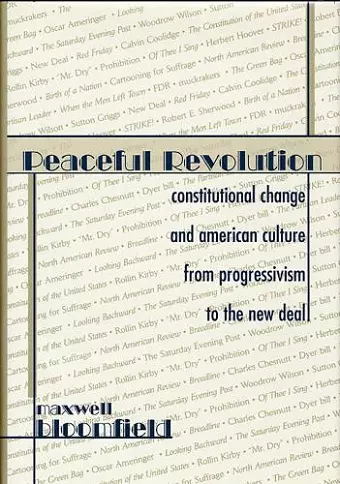Peaceful Revolution
Constitutional Change and American Culture from Progressivism to the New Deal
Format:Hardback
Publisher:Harvard University Press
Currently unavailable, and unfortunately no date known when it will be back

Legal scholars too rarely raise their heads from legal texts, especially Supreme Court reports. When they do, to place the court's opinions 'in context,' they almost always assume that the relevant contexts are political or economic. Bloomfield corrects the lawyers' error by reminding them (and us) that constitutional law also has a cultural context. Not only are court opinions situated in a 'high' intellectual culture of law and elite opinion, which legal scholars participate in and usually take for granted, they also operate in a broader culture of popular ideas. Bloomfield rediscovers and recreates the atmosphere of contemporary popular culture. -- John V. Orth, author of The North Carolina State Constitution
Few Americans understand the Constitution’s workings. Its real importance for the average citizen is as an enduring reminder of the moral vision that shaped the nation's founding. Maxwell Bloomfield looks at the broader appeal that constitutional idealism has always made to the American imagination through publications and films.
Although Americans claim to revere the Constitution, relatively few understand its workings. Its real importance for the average citizen is as an enduring reminder of the moral vision that shaped the nation's founding. Yet scholars have paid little attention to the broader appeal that constitutional idealism has always made to the American imagination through publications and films. Maxwell Bloomfield draws upon such neglected sources to illustrate the way in which media coverage contributes to major constitutional change.
Successive generations have sought to reaffirm a sense of national identity and purpose by appealing to constitutional norms, defined on an official level by law and government. Public support, however, may depend more on messages delivered by the popular media. Muckraking novels, such as Upton Sinclair's The Jungle (1906), debated federal economic regulation. Woman suffrage organizations produced films to counteract the harmful gender stereotypes of early comedies. Arguments over the enforcement of black civil rights in the Civil Rights Cases and Plessy v. Ferguson took on new meaning when dramatized in popular novels.
From the founding to the present, Americans have been taught that even radical changes may be achieved through orderly constitutional procedures. How both elite and marginalized groups in American society reaffirmed and communicated this faith in the first three decades of the twentieth century is the central theme of this book.
Legal scholars too rarely raise their heads from legal texts, especially Supreme Court reports. When they do, to place the court's opinions 'in context,' they almost always assume that the relevant contexts are political or economic. Bloomfield corrects the lawyers' error by reminding them (and us) that constitutional law also has a cultural context. Not only are court opinions situated in a 'high' intellectual culture of law and elite opinion, which legal scholars participate in and usually take for granted, they also operate in a broader culture of popular ideas. Bloomfield rediscovers and recreates the atmosphere of contemporary popular culture. -- John V. Orth, author of The North Carolina State Constitution
An insightful scholarly study of how ideas and images of constitutional government permeate popular culture...A significant contribution to the history of 20th-century popular and political culture. * Kirkus Reviews *
- Nominated for Woodrow Wilson Foundation Award 2001
- Nominated for Merle Curti Award 2001
- Nominated for Littleton-Griswold Prize 2001
ISBN: 9780674003040
Dimensions: 235mm x 156mm x 25mm
Weight: 499g
224 pages